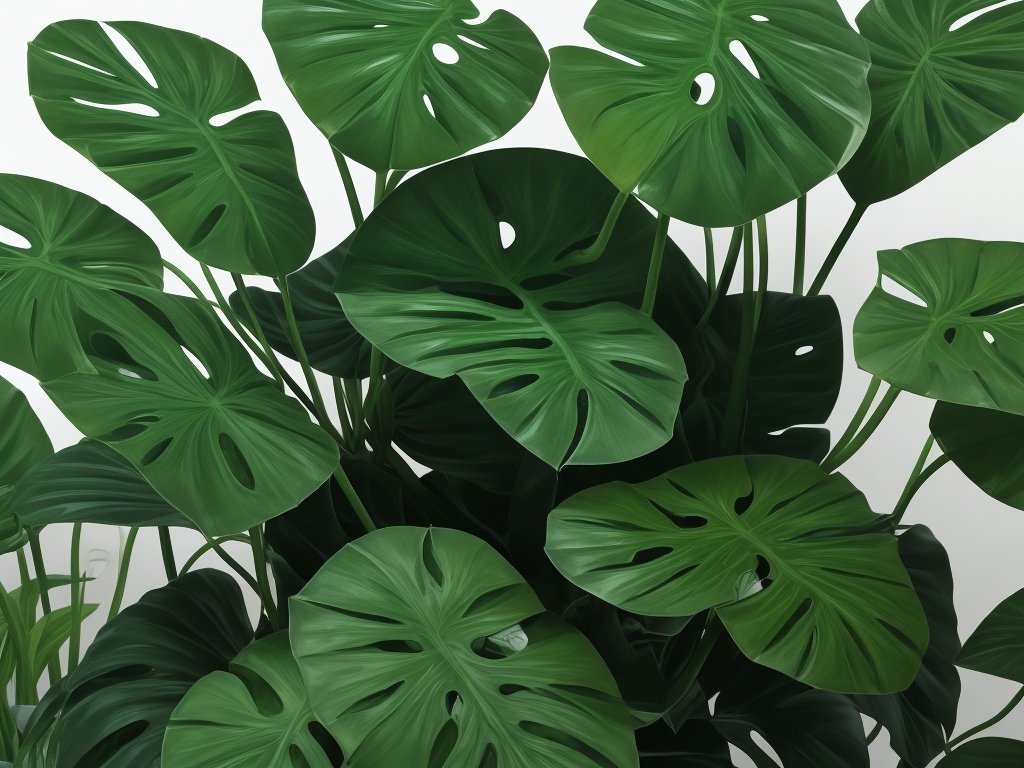Why Are The Stems Of My Monstera Turning Brown?
Key Takeaways:
- Overwatering can cause the stems of your Monstera plant to turn brown.
- Insufficient sunlight and low humidity levels can also contribute to browning stems in Monstera plants.
- Fungal infections and pests can be the culprit behind the browning of Monstera stems.
- Pruning and proper care can help prevent and treat brown stems in Monstera plants.
Do you ever look at your beloved Monstera plant and notice that the once vibrant green stems are turning an unsightly shade of brown? It’s enough to make any plant parent worry.
But fear not! I’m here to shed some light on this common issue and provide you with the answers you need.
In this article, we’ll delve into the world of Monstera plants, explore the reasons behind their browning stems, and discuss effective ways to treat and prevent this problem. So buckle up, plant lovers, and let’s dive into the world of Monstera mysteries!
| Possible Causes | Solutions |
|---|---|
| 1. Overwatering | – Allow the soil to dry out between waterings. – Adjust watering routine based on the specific needs of your Monstera. – Ensure proper drainage to prevent waterlogging. |
| 2. Underwatering | – Water your Monstera adequately, ensuring that the soil remains consistently moist but not waterlogged. – Consider increasing the humidity levels around the plant. – Avoid allowing the soil to completely dry out. |
| 3. Insufficient humidity | – Increase humidity levels around your Monstera by using a humidifier or placing a tray filled with water near the plant. – Mist the leaves regularly with water. – Consider placing the plant in a more humid location in your home. |
| 4. Lack of proper drainage | – Ensure your Monstera is planted in a well-draining soil mix. – Use a pot with drainage holes to prevent water from accumulating at the bottom. – Check the roots for any signs of root rot and replant if necessary. |
| 5. Excessive direct sunlight | – Place your Monstera in bright, indirect light or provide filtered light. – Avoid exposing the plant to intense, direct sunlight which can cause leaf burn. – Consider moving the plant to a slightly shadier location. |
| 6. Nutrient deficiency | – Feed your Monstera with a balanced fertilizer formulated for houseplants. – Ensure the plant is receiving essential nutrients, particularly nitrogen, phosphorus, and potassium. – Follow the recommended dosage and frequency as per the fertilizer instructions. |
| 7. Pests or diseases | – Inspect the leaves and stems for any signs of pests such as mealybugs, scale insects, or spider mites. – If infested, treat the plant with a suitable insecticide or insecticidal soap. – Keep the plant clean and remove any affected foliage to prevent the spread of diseases. |
Understanding Monstera Plants
Monstera plants are tropical vines known for their large, fenestrated leaves and are popular houseplants.
Monstera Plant Care 101
Monstera plant care involves providing the right conditions for your plant to thrive. This includes placing it in a well-lit area away from direct sunlight, watering it when the top inch of soil feels dry, and ensuring it has proper drainage.
Regularly dusting the leaves and occasionally fertilizing will also help keep your Monstera healthy and happy.

Identifying the Issue: Brown Stems on Monstera Plants
Are your Monstera plant stems turning brown? Let’s identify the issue and find out why.
What Causes Brown Stems on Monstera Plants?
The common causes of brown stems on Monstera plants include overwatering and root rot, insufficient drainage, low humidity levels, exposure to direct sunlight, and nutrient deficiencies. These factors can impact the health of the plant and cause the stems to turn brown.
Signs and Symptoms of Brown Stems on Monstera Plants
The key sign of brown stems on Monstera plants is, well, brown stems! You may notice that the stems of your Monstera are turning brown, which can be a cause for concern. In addition to the discoloration, you might also observe other symptoms like wilting leaves, drooping foliage, or stunted growth.
These signs indicate that something isn’t quite right with your plant and it’s time to take action.

Common Reasons for Brown Stems on Monstera Plants
One possible variation for the intro section could be: Brown stems on Monstera plants can be caused by overwatering and root rot, insufficient drainage, low humidity levels, exposure to direct sunlight, or nutrient deficiencies.
Overwatering and Root Rot
Overwatering is a common cause of brown stems on Monstera plants.
When the soil is consistently wet, it can lead to root rot, which prevents the plant from absorbing nutrients properly.
This can result in browning of the stems.
To prevent overwatering and root rot, it’s important to allow the top inch of soil to dry out before watering again.
Ensure that the pot has proper drainage to allow excess water to escape.
Additionally, make sure not to water too frequently and avoid leaving the plant in standing water.
Regularly check the moisture level of the soil and adjust your watering schedule accordingly.
Insufficient Drainage
Insufficient drainage is one common reason for brown stems on Monstera plants. When water is unable to properly escape from the pot, it can lead to excess moisture, causing the roots to rot and the stems to turn brown.
To address this issue, make sure your plant is in a pot with drainage holes, use well-draining soil, and avoid overwatering.

Low Humidity Levels
Low humidity levels can cause the stems of Monstera plants to turn brown. It means the air is too dry for them, and they’re not getting enough moisture.
This can be a common issue, especially in dry climates or during the winter when indoor heating is on.
Exposure to Direct Sunlight
Excessive exposure to direct sunlight can cause the stems of Monstera plants to turn brown. The intense sunlight can scorch the leaves and stems, leading to browning and damage.
It’s important to place your Monstera in a location with bright, indirect light to prevent this issue.
If your plant is already experiencing browning due to sun exposure, consider moving it to a shadier spot to allow it to recover.
Nutrient Deficiencies
Nutrient deficiencies can cause brown stems on Monstera plants. Lack of essential nutrients like nitrogen, phosphorus, or potassium can weaken the plant’s overall health and lead to browning.
To address this issue, fertilize your Monstera regularly with a balanced plant food and ensure that the soil has proper nutrient levels.
How to Treat and Prevent Brown Stems on Monstera Plants
To treat brown stems on Monstera plants, prune off the affected parts and adjust the watering routine.
Prevent brown stems by ensuring proper drainage and avoiding overwatering.
Steps to Treat Brown Stems on Monstera Plants
To treat brown stems on Monstera plants, first, identify the underlying cause. Cut off any affected parts with clean pruning shears.
Improve drainage by repotting in well-draining soil.
Adjust watering to avoid overwatering. Increase humidity levels.
Provide indirect light.
Use a balanced fertilizer to provide the necessary nutrients. Monitor your plant regularly and make adjustments as needed.
Preventing Brown Stems on Monstera Plants
To prevent brown stems on Monstera plants, proper plant care is essential. Here are a few tips:
- Water your Monstera plant thoroughly but allow the top inch of soil to dry out before watering again.
- Ensure that your Monstera has good drainage by using well-draining soil and a pot with drainage holes.
- Maintain a humidity level of around 50-60% to prevent dryness. You can use a humidifier or place a tray of water near the plant.
- Avoid placing your Monstera in direct sunlight, as this can cause the stems to turn brown. Indirect, bright light is ideal.
- Provide balanced nutrition to your Monstera by fertilizing it regularly with a balanced houseplant fertilizer.
Frequently Asked Questions about Brown Stems on Monstera Plants
Can I save my Monstera plant if the stems are turning brown?
Yes, you can save your Monstera plant if the stems are turning brown. The key is to identify the cause of the issue, such as overwatering, insufficient drainage, low humidity levels, exposure to direct sunlight, or nutrient deficiencies.
Once you determine the cause, you can take specific steps to treat the problem and prevent further browning.
Can brown stems on Monstera plants be a sign of pests or diseases?
Yes, brown stems on Monstera plants can be a sign of pests or diseases. Common pests that can cause brown stems include spider mites, mealybugs, and scale insects.
Diseases like fungal infections can also lead to brown discoloration.
It’s important to identify and treat the underlying issue promptly to save your plant.
Is it normal for Monstera plant stems to turn brown?
Yes, it is normal for Monstera plant stems to turn brown.
As the plant matures, older leaves and stems naturally begin to age and turn brown.
However, if the browning is excessive or accompanied by other signs of distress, it may indicate a problem that needs attention.
Monitoring the plant’s overall health and addressing any issues promptly can help maintain its vibrant appearance.
How often should I water my Monstera plant to prevent brown stems?
To prevent brown stems on your Monstera plant, it’s important to find the right balance when watering. Aim to water your Monstera plant thoroughly whenever the top inch of soil feels dry to the touch.
Avoid overwatering, as this can lead to root rot and brown stems.
Regularly checking the soil moisture is key to maintaining a healthy watering schedule.
Final Verdict
Understanding the care needs of Monstera plants is crucial to prevent and treat brown stems.
Overwatering, insufficient drainage, low humidity, exposure to direct sunlight, and nutrient deficiencies are common causes of this issue.
To treat brown stems, adjust watering habits, improve drainage, increase humidity levels, and provide adequate shade.
Regularly check for pests and diseases as well.
By following these tips and providing proper care, you can save your Monstera plant and ensure healthy, vibrant stems.
Remember, prevention is key to maintaining the overall health of your Monstera plant.







